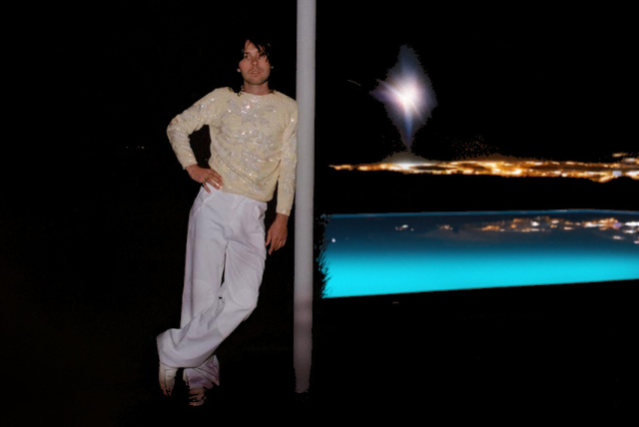
Lewis OfMan is somewhere between a Parisian sprite and a dandy, a musician and producer dancing to a beat of his own creation; stemming from his roots as a prodigal adolescent drummer.
He comes alive on stage, with exciting basslines and rhythms punctuated by his electric skills on various synths — an uplifting event to witness that can be felt in his crowd’s exuberance.
His debut album Sonic Poems, produced by Tim Goldworthy (LCD Soundsystem, The Rapture..) was met with great reception and earned him fans globally, causing him to regularly sell out shows both in his native France as well as North America in 2022, sharing the stage with his long term collaborators Sofie Royer and Cola Boyy. He has worked with brands such as Versace and Diptyque, and always lends his signature style of cool to artists and brands he produces for.
This year Lewis OfMan has toured and worked with Carly Rae Jepsen, and can be found hitting North America this spring, with a new single and his sophomore record to follow shortly.
Her career began here, where she sang in basements, churches, and gyms before starting her first band, Alyeska. Soon talent, and her parents’ minivan, drove her to tour further west. Now, Reid splits her time between the coastlines and the mountainous West, splitting what time she can between the two and working in both cities. “I’m interested in the effects of place on songwriting and the idea of regional writing,” she says. “I like to think I’m in a healthy relationship with it, where I’m still really inspired by my hometown, but I’m not trapped by it.”
Ask Reid how she’d define her sound and she’ll hesitate before landing on “Mountain Pop,” drawing from the deep traditions of American country songwriting, the big, gritty guitars of Northwestern grunge, and the unrushed ease of Southern California living. In the depths of the pandemic, she released Big Bunny, an EP indebted to a coming-of-age chasing rabbits, throwing bottles in the creek, and kissing in damp old houses. In the years since, she’s brought her unique take on Americana across the country, opening for the likes of Charli XCX, Porches, Caroline Polachek, Magdalena Bay, Del Water Gap, and the Drums, all while writing her debut full-length, Disenchanter.
Due out July 14th via Luminelle, Disenchanter, is as much a collection of stories as it is a collection of songs. Reid’s father is a writer, and she grew up in a robust literary community, counting novelists like Graham Greene as some of her greatest sources of inspiration. “I love country music because I love storytelling,” Reid says. “Every track on this album has an element of my autobiography in it, but the dosage varies. I write composite characters, or characters based on friends, squirreling bits of fiction in with truth.”
Reid wrote the single “Back to This” after hiking through the Absaroka-Beartooth Wilderness, where she witnessed a group of forest service workers on a break and marveled at how serene they looked, like she’d stumbled into a Grecian mythological scene. “I fantasize about other people’s lives, other people’s professions, and writing is a way I can approximate what it must be like to be someone else,” she says. Its lyrics reference the surreal bravery of smoke jumpers fighting wildfires in the mountain west, people in their twenties as beautiful in the waning light of day as the natural beauty surrounding them. “Will you and I look as beautiful years later in that sweaty photograph as they looked to me that day in the forest?” Reid sings to an unnamed companion over
glittering guitar and synthlines that might soundtrack the school dance scene in an eighties movie. “With my head in the slipstream and my heart beating fast.”
Though Reid’s principle instrument is guitar, she worked on Disenchanter with A. G. Cook, whose synths and the duo’s combined array of pedals allowed Reid to explore her pop
inclinations after she recorded each track live at home in both Montana and California. “I have my road dog arsenal from playing tons of live shows, so most of the songs have at least one guitar with my personal chain in homage to my live set up,” she says. “We’d then layer combinations of A. G.’s pedals onto the track, and the contrast between them mirrors our respective musical approaches.”
Take single“Dogs & Girls,” which opens with a watery affected guitar harmonic that coheres with Reid’s muscular guitar, its constant presence on the album grounding the work in Americana. On that song, Reid recalls a poster of a missing girl spotted at a roadside casino in middle-of-nowhere Nevada, “I was thinking about how we always see signs for missing women and dogs –all of it so shockingly casual. In contrast we fight over and are outlived by things like water, drugs and oil.
Like the songwriters Reid is most inspired by (she namechecks Joni Mitchell alongside Paul Westerberg and J Mascis) Disenchanter narrates a landscape of emotional states, some lived and others borrowed. The propulsive, upbeat “Palomino” is told from the point of view of Reid’s mother, while “She Wonders” recollects hazy memories of bygone tours. Over a fuzzed guitar part and dense rhythm section, Reid sings of motel rooms and cracked leather couches and an undefinable yearning for something more. “The mist of Texas rain makes a halo ‘round her face and he asks her on the Jackalope patio, ‘Do you feel like a rock star on stage?’” Her voice, earthy and conversational, creates intimacy with the listener; it is as if we’re sitting across from Reid in that motel bed, in the passenger seat of that car driving up dust devils.
“I read a lot of fantasy, and there’s a character I was introduced to called the Fiend Folio, who can absorb the power of magical objects by coming in contact with them, and in turn, drains the magic from them, disenchants them,” Reid says. “Maybe it’s morbid, but a writer takes an experience and turns it around and around, looking for what makes it worth paying attention to, what makes it enchanting, and in doing so, drains some of that magic and metabolizes it into something that belongs to them.” While Reid might consider herself a disenchanter, her work also does the inverse: it finds magic in everyday, passing moments, and memorializes them into something worth remembering.



